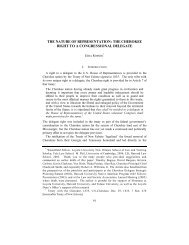Climbing Above the Culture Clash
Climbing Above the Culture Clash
Climbing Above the Culture Clash
You also want an ePaper? Increase the reach of your titles
YUMPU automatically turns print PDFs into web optimized ePapers that Google loves.
which is reflected in land use regulation,<br />
reflects particular ideas about women in<br />
homes as <strong>the</strong>y interact with workplaces. I’ve<br />
written about work-family policy generally.<br />
I also just published a book with a colleague<br />
from ano<strong>the</strong>r law school called The Essentials<br />
of Family Law.<br />
LM: I went into law teaching with a strong<br />
interest in doing work in gender and law<br />
and feminist legal <strong>the</strong>ory. When I started at<br />
Hofstra University, I designed <strong>the</strong> feminist<br />
legal <strong>the</strong>ory class. Toward <strong>the</strong> end of my time<br />
at Hofstra, I designed a gender colloquium<br />
with a colleague [Joanna Grossman], who<br />
is <strong>the</strong> co-editor of my new book, Gender<br />
Equality. So I had done it one time before I<br />
came to BU.<br />
I have always had an interest in gender as a<br />
category of analysis. When I went into law<br />
teaching, one of my big goals was to be able<br />
to do more with that interest, to write and<br />
teach in that area.<br />
Q: How does <strong>the</strong> Gender, Law &<br />
Public Policy colloquium differ from<br />
o<strong>the</strong>r gender-related courses at BU<br />
Law<br />
LM: Ra<strong>the</strong>r than have a whole course devoted<br />
to a study, say, of feminist legal <strong>the</strong>ory, you’re<br />
really looking at gender as a very big category.<br />
And you are looking at an array of speakers,<br />
not all of whom may approach <strong>the</strong> topic from<br />
a feminist <strong>the</strong>ory perspective. For example,<br />
this fall one of our speakers from Suffolk<br />
[Frank Rudy Cooper] has done a lot of work<br />
on black masculinity. And so he’s going to be<br />
looking at <strong>the</strong> recent arrest of Professor Gates<br />
through <strong>the</strong> lens of black masculinity <strong>the</strong>ory.<br />
It’s not a systematic course, where a student<br />
would go in and come out knowing seven<br />
different schools of feminist thought and<br />
15 current debates among feminists. It’s<br />
more like, if we try to focus on gender and<br />
how questions of gender are at <strong>the</strong> heart of<br />
a lot of law and policy debates, what can we<br />
learn And it changes semester to semester.<br />
This semester we’re going to have a session<br />
on rights of women in Islam and Judaism to<br />
public prayer. We didn’t really discuss women<br />
and religion last time.<br />
And I think that students also like <strong>the</strong><br />
opportunity to be able to engage with each<br />
o<strong>the</strong>r in a relatively small class where <strong>the</strong>y<br />
are challenged to express <strong>the</strong>ir reaction to a<br />
piece and to try to assess <strong>the</strong> strengths and<br />
weaknesses of it. In o<strong>the</strong>r words, it’s not<br />
passive learning. •<br />
Editor’s note: BU Law Professors Kristin Collins,<br />
Pnina Lahav, Linda McClain and Katharine<br />
Silbaugh each specialize in aspects of gender<br />
and <strong>the</strong> law, along with many o<strong>the</strong>r academic<br />
interests. McClain will teach this course again<br />
in <strong>the</strong> fall with a new lineup of scholars that<br />
includes Collins and Lahav.<br />
Professor McClain’s latest book, Gender<br />
Equality: Dimensions of Women’s Equal<br />
Citizenship (Cambridge University Press<br />
2009), looks at <strong>the</strong> discrepancy between<br />
nations’ formal commitments to gender<br />
equality and <strong>the</strong> experiential reality of<br />
women’s lives. McClain co-edited <strong>the</strong><br />
book with a former colleague at Hofstra<br />
University, Professor Joanna Grossman.<br />
The book brings toge<strong>the</strong>r 21 experts from different disciplines<br />
to look at gender equality through <strong>the</strong> lens of citizenship,<br />
covering topics ranging from “Stem Cells, Disability and<br />
Abortion: A Feminist Approach to Equal Citizenship” to<br />
“Gender and Human Rights: Between Morals and Politics.”<br />
The collection of articles covers constitutional citizenship,<br />
political citizenship, social citizenship, sexual and reproductive<br />
citizenship and global citizenship — all in exploration of <strong>the</strong><br />
gap between <strong>the</strong> ideal of gender equality and <strong>the</strong> current reality,<br />
and what it would take for <strong>the</strong> ideal to be realized.<br />
On October 23, 2009, McClain moderated a panel at <strong>the</strong><br />
daylong symposium at BU Law, “Courting Change: Legal<br />
Perspectives on Contemporary LGBT Issues,” which examined<br />
legal issues surrounding LGBT rights.<br />
On October 27, 2009, BU Law hosted a panel on <strong>the</strong> book,<br />
moderated by Professor Pnina Lahav, and a reception. Panelists<br />
included BU College of Arts and Sciences Dean Gina Sapiro,<br />
BU Women’s Studies Director Diane Balser and Harvard<br />
Kennedy School of Government Professor Jane Mansbridge.<br />
Fall 2009 | The Record | 27









